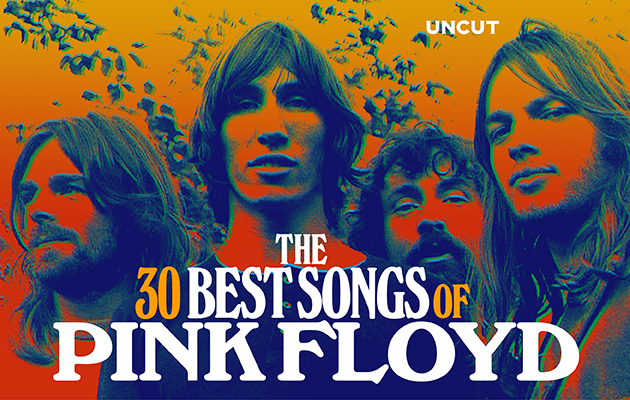To coincide with our world exclusive interview with David Gilmour in this month’s Uncut, here’s the Floyd’s 30 greatest songs… as voted for by Gilmour himself, Nick Mason and their friends, fellow musicians and famous fans, including Paul Weller, Jarvis Cocker, Wayne Coyne, Ice Cube, Jim Reid, Mick Rock, Robert Wyatt and more… Originally published in Uncut’s October 2008 issue (Take 137).
______________________________
FOREWORD BY DAVID GILMOUR
“So, the Top 30 Pink Floyd songs. Hmm. When I joined, it sometimes never looked like we’d even be able to write any songs at all, so to have 30 songs that different people love is something of an achievement, I suppose! Looking through the Pink Floyd songbook of the past 40 years surprises me sometimes. There are hundreds of songs, we go through lots of different styles of music, three different leaders and at least three different singers, and dozens of guests. But everything’s linked by this collective psyche. When you’re playing a Floyd song, there’s a certain underground feel – it’s difficult to define, but it’s about texture, about atmosphere, about the use of space. It’s rarely about the technical stuff.
“I suppose there are several distinct stages in Pink Floyd’s songwriting history. Obviously, there’s the Syd era, which was before I joined. Then the second stage occurred in the years after he left, when we were all scrabbling around, trying to fill that Syd-shaped hole in the band and not knowing entirely what we were doing. We initially tried to write the quirky, well-structured pop songs that Syd wrote, but we couldn’t. Then, quite by accident, we developed what we were good at – those spacey, atmospheric instrumentals. And then there’s a third stage, where we started to turn those instrumentals into properly structured songs, and that hit a peak with Dark Side Of The Moon, Wish You Were Here and Animals. Then the stuff after Roger left is yet another stage.
“On my first solo tour in 1985, I didn’t want to do any Pink Floyd songs. I think I grudgingly did a version of “Money”, but the whole issue of playing old material was a bit sore. Nowadays, when I tour, both as a solo act and as one third of Pink Floyd, I’m happy to play Pink Floyd songs from every era of the band’s history. There’s an emphasis on my side of the songs – or mine and Rick’s – and I feel uncomfortable doing things that are too heavily associated with Roger. It’s not a political thing, there’s no bad feeling about that, it’s just that they’re his songs to do. So I’d feel uncomfortable doing “Money” nowadays, same with things like “Another Brick In The Wall”, even though they’re all great, great songs.
“I’ve always played a few of Syd’s numbers. When I did Robert [Wyatt]’s Meltdown we played “Terrapin”, which was from a solo album that I produced for Syd; a month before Syd died we did “Arnold Layne” at the Albert Hall with Bowie; we played “Dark Globe” after Syd died; and we still play “Astronomy Domine”. I’ve revisited “Fat Old Sun” from Atom Heart Mother and a few other early things. Each one always sounds really fresh. But I’m proud of everything there, really.
“In the early days of a band you tend to write songs together. You spend all your time together, you jam in rehearsal studios, and you tend to write collectively. Then, you spend more time apart, and your songs tend to be based on ideas that were written individually. With us, sometimes the ideas would be mine, occasionally they’d be Rick’s, but invariably they’d be Roger’s. The main writer would bring the idea, which would be largely worked out beforehand, and it would then go through a process of being filtered through the influence of the rest of the band.
“Rick’s input started to fizzle out throughout the 1970s. In fact, by The Wall, even I wasn’t writing much. “Comfortably Numb” and “Run Like Hell” were two of the few tracks where I came up with the initial idea there – I think the producer Bob Ezrin played them to Roger and convinced him to get stuck in with it. I don’t think it was Roger being a dictator, it was more that we were happy to let him get on with it. And that was how we wrote for years – it was only with The Division Bell that we started to rectify that and write like we did in the old days, collectively, jamming in the studio.
“We were never the most proficient musicians. When the band started, Pink Floyd were unique in that they weren’t great blues players. In fact, we never did become that musically accomplished! And that pushes you to try other things – instead of copying Muddy Waters or whatever, you start to explore the sounds in your own head. You start to explore textures, hypnotic basslines, guitar effects, that kind of thing. That’s always been a part of our collective psyche. You have a sound in your head and you try to replicate it. I’m always looking for new sounds. And it’s true that I never used my guitar as a “riff machine”, it was always a mechanism for creating textures and atmosphere. That’s why, no matter how many records we sold, Pink Floyd were always an “underground band”. It was the way we approached music.”
Order Uncut’s Deluxe Ultimate Music Guide: Pink Floyd while stocks last at Backstreetmerch.com


